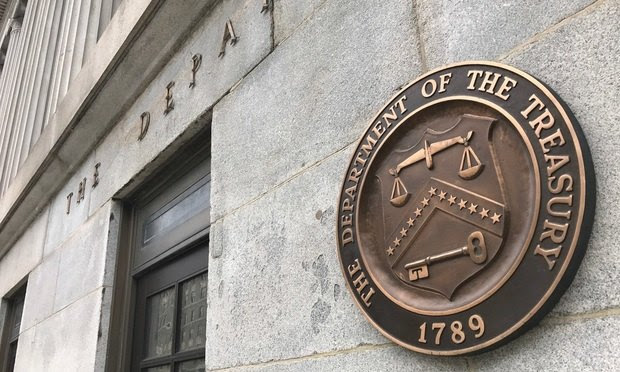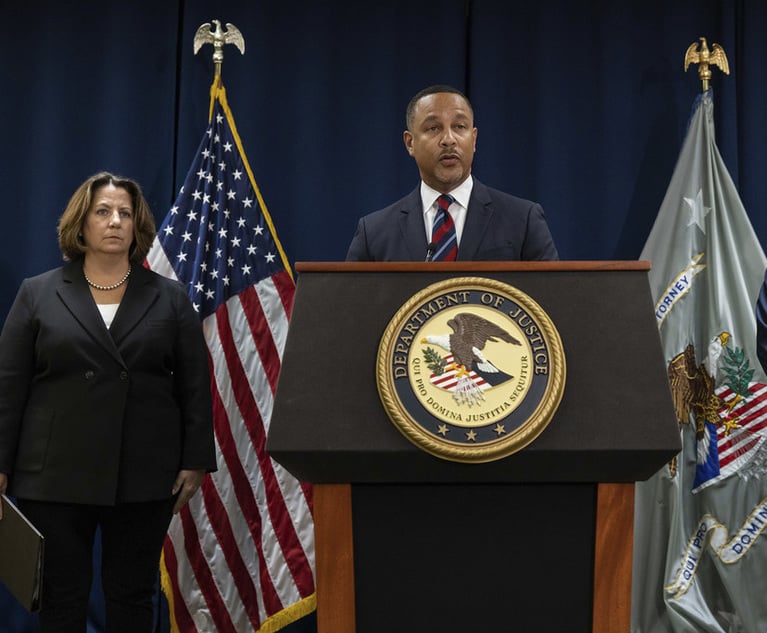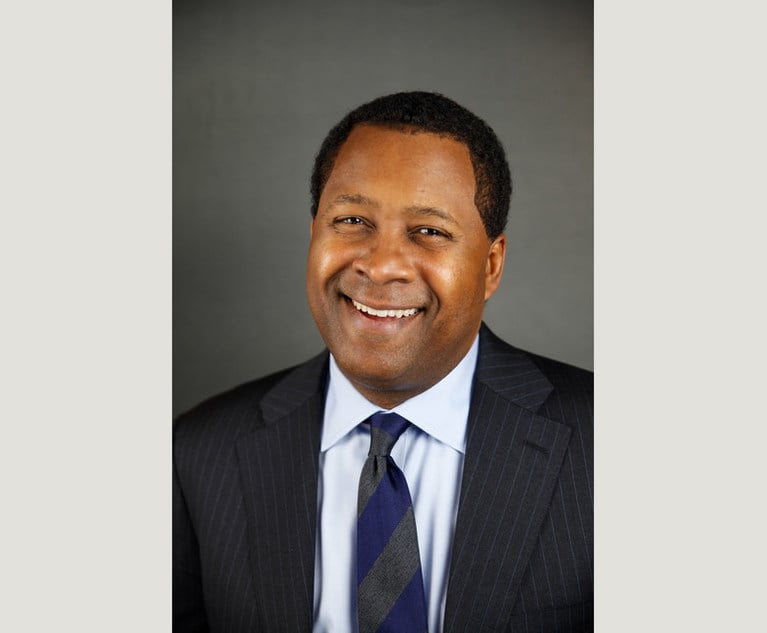Compliance Hot Spots: CFIUS Draft Rules on 'Sensitive Personal Data' | New and Notable FARA Filings | News Roundup: 'Public Servants Versus Donald Trump' | Who Got the Work
Welcome to Compliance Hot Spots -- we're highlighting some commentary on CFIUS draft rules. Plus: a snippet on new and notable FARA filings, which reveal some Big Law hourly rates. Who Got the Work -- and all the big moves are here. Thanks for reading!
October 15, 2019 at 09:00 PM
8 minute read
Welcome to Compliance Hot Spots, and good evening from Washington, where the Nationals soon could clinch their first-ever World Series appearance. Lots to unpack this week, including a report on draft CFIUS rules. Also: New "foreign agent" filings at the US Justice Dept. are offering a peek at hourly rates at some Big Law firms. And The New Yorker has an engaging report looking at public servants confronting President Trump.
Tips, feedback and general thoughts on your practices are always appreciated. I'm C. Ryan Barber—reach me at [email protected] and 202-828-0315, or follow me on Twitter @cryanbarber. Thanks for reading!

CFIUS Draft Rules on 'Sensitive Personal Data'
Proposed regulations for national security reviews of foreign investments in U.S. companies could subject many more deals to scrutiny, particularly those involving firms that store large amounts of sensitive personal data, my colleague MP McQueen reports at Law.com.
The draft regulations are expected to expand the scope of the Committee on Foreign Investment in the U.S., an interagency panel that reviews investments for their potential harm to national security. The proposals could influence how lawyers and their clients structure deals involving sensitive data, such as whether to allow foreign investors to provide input into certain types of decisions, or to play roles that could trigger CFIUS's jurisdiction, and whether it would be prudent to voluntarily file for a CFIUS review even when one is not mandatory, according to our reporting.
The draft rules were released on Sept. 17 with a shorter-than-usual 30-day comment period during which stakeholders can make written statements about the rulemaking's impact. Final regulations will be issued early next year.
>> "We are going to see more clients who inadvertently undergo investments where they don't realize this new CFIUS requirement could be triggered," said Steptoe & Johnson LLP partner Brian Egan. "We are going to have more after-the-fact questions from companies that didn't know an investment was within CFIUS's jurisdiction, and just got a letter from CFIUS and ask, 'What do we do?' This will lead to more filings with CFIUS."
>> "This will be a big thing for companies that are data-centric," said David Hanke, a partner at Arent Fox in its international trade and national security practice. "More thinking and planning on their part will be needed up-front to understand the potential risks."

Who Got the Work
>> A team from DLA Piper, including Richard Newcomb, partner in Washington and chair of the international trade practice group, is advising Azerbaijan Railways CJSC, according to a new Foreign Agents Registration Act filing at the U.S. Justice Department. "The registrant will provide the foreign principal with legal advice and assistance relating to U.S. sanctions on Iran that affect the transport of oil, gas, and other petrochemical products that originate in third countries and that transit through Iran," the filing said. The filings showed Newcomb billing at $1,190 hourly. Additionally, Rochelle Stern, of counsel bills at $895, and Lawrence Levinson, senior counsel, bills at $750 hourly. We posted a roundup of some of the new and notable filings this week at the NLJ. Check it out here.
 >> Lawyers from Skadden, Arps, Slate, Meagher & Flom are representing Telegram Group Inc. in a new SEC enforcement action in SDNY. "U.S. regulators sued a company that raised $1.7 billion through a cryptocurrency offering that became one of the largest such deals ever," the WSJ reports. Steven Peikin, co-director of the SEC's Division of Enforcement, said in a statement: "We have repeatedly stated that issuers cannot avoid the federal securities laws just by labeling their product a cryptocurrency or a digital token." Defense counsel for Telegram Group Inc. and TON Issuer Inc. include Skadden partners Colleen Mahoney (at left) in Washington and Alex Drylewski in New York. Mahoney heads the firm's securities enforcement practice.
>> Lawyers from Skadden, Arps, Slate, Meagher & Flom are representing Telegram Group Inc. in a new SEC enforcement action in SDNY. "U.S. regulators sued a company that raised $1.7 billion through a cryptocurrency offering that became one of the largest such deals ever," the WSJ reports. Steven Peikin, co-director of the SEC's Division of Enforcement, said in a statement: "We have repeatedly stated that issuers cannot avoid the federal securities laws just by labeling their product a cryptocurrency or a digital token." Defense counsel for Telegram Group Inc. and TON Issuer Inc. include Skadden partners Colleen Mahoney (at left) in Washington and Alex Drylewski in New York. Mahoney heads the firm's securities enforcement practice.
>> Squire Patton Boggs filed a lobbying registration for Raytheon focused on air traffic control reform. The lobbying team includes Timothy Drake, former U.S. Rep. Bill Shuster and Rebekah Sungala.

Compliance Reading Corner
>> Inside Mark Zuckerberg's private meetings with conservative pundits. "Facebook CEO Mark Zuckerberg has been hosting informal talks and small, off-the-record dinners with conservative journalists, commentators and at least one Republican lawmaker in recent months to discuss issues like free speech and discuss partnerships … News of the outreach is likely to further fuel suspicions on the left that Zuckerberg is trying to appease the White House and stay out of Trump's crosshairs. The president threatened to sue Facebook and Google in June and has in the past pressured the Justice Department to take action against his perceived foes." [Politico] Zuckerberg responds: "Meeting new people and hearing from a wide range of viewpoints is part of learning. If you haven't tried it, I suggest you do!"
>> Former Executive Wasn't Defamed When Biomet Called Him a Compliance Risk, Court Rules. "Designating someone a compliance risk doesn't constitute defamation, a federal appeals court in Chicago has ruled. The ruling, issued this week, is a victory for medical device manufacturer Zimmer Biomet Holdings Inc., which was sued by a former employee after it placed him on a list of entities that the company said posed a risk to its compliance with antibribery laws." [WSJ]
>> Public Servants Versus Donald Trump. James Baker, a former FBI general counsel who was central to approving the Russia investigation, now leads the national security and cyber team at the think tank R Street Institute. "Certain corporations and law firms thought that I was too controversial and didn't want to hire me. It surprised me and was dispiriting." Baker speaks out about confronting Donald Trump publicly now. [The New Yorker]
 >> Appeals Panel Questions Government Program on Exchange Trading Fees. "Judges for a federal appeals court sharply questioned whether regulators worried about market fairness can require stock exchanges to experiment with the fees they charge. The judges, hearing a lawsuit Friday brought by the New York Stock Exchange and other trading venues, debated whether federal regulators justified a pilot program that would limit the trading fees charged by exchanges. At issue is the dominant pricing system used by exchanges, which charges fees for some trades while giving brokers subsidies for sending certain other orders to their venues." Gibson Dunn's Thomas Hungar, at left, argued for the NYSE. [WSJ]
>> Appeals Panel Questions Government Program on Exchange Trading Fees. "Judges for a federal appeals court sharply questioned whether regulators worried about market fairness can require stock exchanges to experiment with the fees they charge. The judges, hearing a lawsuit Friday brought by the New York Stock Exchange and other trading venues, debated whether federal regulators justified a pilot program that would limit the trading fees charged by exchanges. At issue is the dominant pricing system used by exchanges, which charges fees for some trades while giving brokers subsidies for sending certain other orders to their venues." Gibson Dunn's Thomas Hungar, at left, argued for the NYSE. [WSJ]
>> CFTC Says Cryptocurrency Ether Is a Commodity. "We've been very clear on bitcoin: bitcoin is a commodity. We haven't said anything about ether—until now," CFTC Chairman Heath Tarbert said on stage at Yahoo Finance's All Markets Summit in New York. "It is my view as chairman of the CFTC that ether is a commodity."[Yahoo Finance]
>> Trump to Curb Use of Federal Guidance in Issuing Regulations. "President Trump is planning to sign a pair of executive orders on Wednesday meant to limit the use of a tool that the administration argues circumvents the federal rule-making process, according to administration officials." [WSJ]

Notable Moves & More
• Baker McKenzie said it hired regulatory partners Veleka Peeples-Dyer and Khelin Aiken in Washington. They arrived from McDermott Will & Emery. Peeples-Dyer, who co-led her former firm's FDA practice, will chair Baker McKenzie's North America FDA practice.
• "Kristen Limarzi has become a partner in Gibson Dunn & Crutcher's Washington, DC, office after more than a decade at the US Department of Justice's antitrust division," Global Competition Review reports. Limarzi, before her Justice Department career, was a King & Spalding associate in Washington.
• King & Spalding has rehired Dan Coats, former director of National Intelligence who spent five years as a lobbyist at the firm before his 2010 reelection to the U.S. Senate. Coats rejoins King & Spalding as a senior policy adviser on its national security team in Washington.
• Alston & Bird has brought on Richard Slowinski, formerly the tax practice head at Baker McKenzie. Slowinski had practiced for more than 25 years at Baker McKenzie.
• Katten Muchin Rosenman said Vikas Khanna, former deputy chief of the criminal division of the U.S. attorney's office in Newark, has rejoined the firm's New York office as a white-collar partner.
• The Federal Trade Commission said Bruce Hoffman is leaving the agency as head of the bureau of competition. FTC Chairman Joe Simons said Hoffman, who's led the bureau for more than two years, would step down in November. "Bruce has done an outstanding job leading the FTC's vigorous antitrust enforcement efforts for the last two years," Simons said in a statement.
This content has been archived. It is available through our partners, LexisNexis® and Bloomberg Law.
To view this content, please continue to their sites.
Not a Lexis Subscriber?
Subscribe Now
Not a Bloomberg Law Subscriber?
Subscribe Now
NOT FOR REPRINT
© 2025 ALM Global, LLC, All Rights Reserved. Request academic re-use from www.copyright.com. All other uses, submit a request to [email protected]. For more information visit Asset & Logo Licensing.
You Might Like
View All
Compliance Hot Spots: GOP Eyes ESG as an Antitrust Issue + Another DOJ Crypto Seizure + Sidley Partner Jumps to Main Justice
9 minute read
Compliance Hot Spots: Lessons from Lafarge + Fraud Section Chief Talks Compliance + Cravath Lands FTC Commissioner
11 minute readTrending Stories
- 1'Shame on Us': Lawyer Hits Hard After Judge's Suicide
- 2Upholding the Integrity of the Rule of Law Amid Trump 2.0
- 3Connecticut Movers: New Laterals, Expanding Teams
- 4Eliminating Judicial Exceptions: The Promise of the Patent Eligibility Restoration Act
- 5AI in Legal: Disruptive Potential and Practical Realities
Who Got The Work
J. Brugh Lower of Gibbons has entered an appearance for industrial equipment supplier Devco Corporation in a pending trademark infringement lawsuit. The suit, accusing the defendant of selling knock-off Graco products, was filed Dec. 18 in New Jersey District Court by Rivkin Radler on behalf of Graco Inc. and Graco Minnesota. The case, assigned to U.S. District Judge Zahid N. Quraishi, is 3:24-cv-11294, Graco Inc. et al v. Devco Corporation.
Who Got The Work
Rebecca Maller-Stein and Kent A. Yalowitz of Arnold & Porter Kaye Scholer have entered their appearances for Hanaco Venture Capital and its executives, Lior Prosor and David Frankel, in a pending securities lawsuit. The action, filed on Dec. 24 in New York Southern District Court by Zell, Aron & Co. on behalf of Goldeneye Advisors, accuses the defendants of negligently and fraudulently managing the plaintiff's $1 million investment. The case, assigned to U.S. District Judge Vernon S. Broderick, is 1:24-cv-09918, Goldeneye Advisors, LLC v. Hanaco Venture Capital, Ltd. et al.
Who Got The Work
Attorneys from A&O Shearman has stepped in as defense counsel for Toronto-Dominion Bank and other defendants in a pending securities class action. The suit, filed Dec. 11 in New York Southern District Court by Bleichmar Fonti & Auld, accuses the defendants of concealing the bank's 'pervasive' deficiencies in regards to its compliance with the Bank Secrecy Act and the quality of its anti-money laundering controls. The case, assigned to U.S. District Judge Arun Subramanian, is 1:24-cv-09445, Gonzalez v. The Toronto-Dominion Bank et al.
Who Got The Work
Crown Castle International, a Pennsylvania company providing shared communications infrastructure, has turned to Luke D. Wolf of Gordon Rees Scully Mansukhani to fend off a pending breach-of-contract lawsuit. The court action, filed Nov. 25 in Michigan Eastern District Court by Hooper Hathaway PC on behalf of The Town Residences LLC, accuses Crown Castle of failing to transfer approximately $30,000 in utility payments from T-Mobile in breach of a roof-top lease and assignment agreement. The case, assigned to U.S. District Judge Susan K. Declercq, is 2:24-cv-13131, The Town Residences LLC v. T-Mobile US, Inc. et al.
Who Got The Work
Wilfred P. Coronato and Daniel M. Schwartz of McCarter & English have stepped in as defense counsel to Electrolux Home Products Inc. in a pending product liability lawsuit. The court action, filed Nov. 26 in New York Eastern District Court by Poulos Lopiccolo PC and Nagel Rice LLP on behalf of David Stern, alleges that the defendant's refrigerators’ drawers and shelving repeatedly break and fall apart within months after purchase. The case, assigned to U.S. District Judge Joan M. Azrack, is 2:24-cv-08204, Stern v. Electrolux Home Products, Inc.
Featured Firms
Law Offices of Gary Martin Hays & Associates, P.C.
(470) 294-1674
Law Offices of Mark E. Salomone
(857) 444-6468
Smith & Hassler
(713) 739-1250










